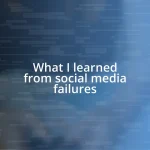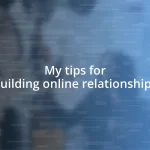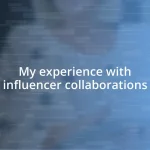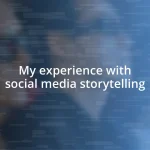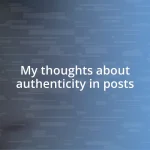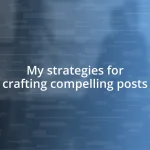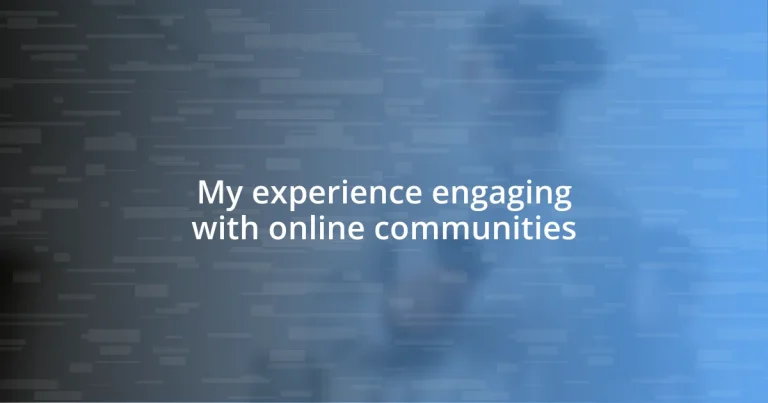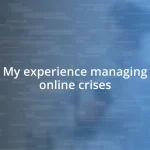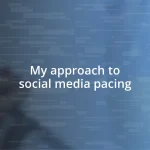Key takeaways:
- Online communities facilitate genuine connections and personal growth through shared interests and experiences, leading to friendships that transcend the digital realm.
- Choosing the right platform is crucial for effective engagement, emphasizing community participation, content alignment, user interface, moderation, and accessibility.
- Building meaningful connections involves emotional vulnerability, open discussions, and participating in collaborative initiatives, enhancing the sense of belonging within the community.
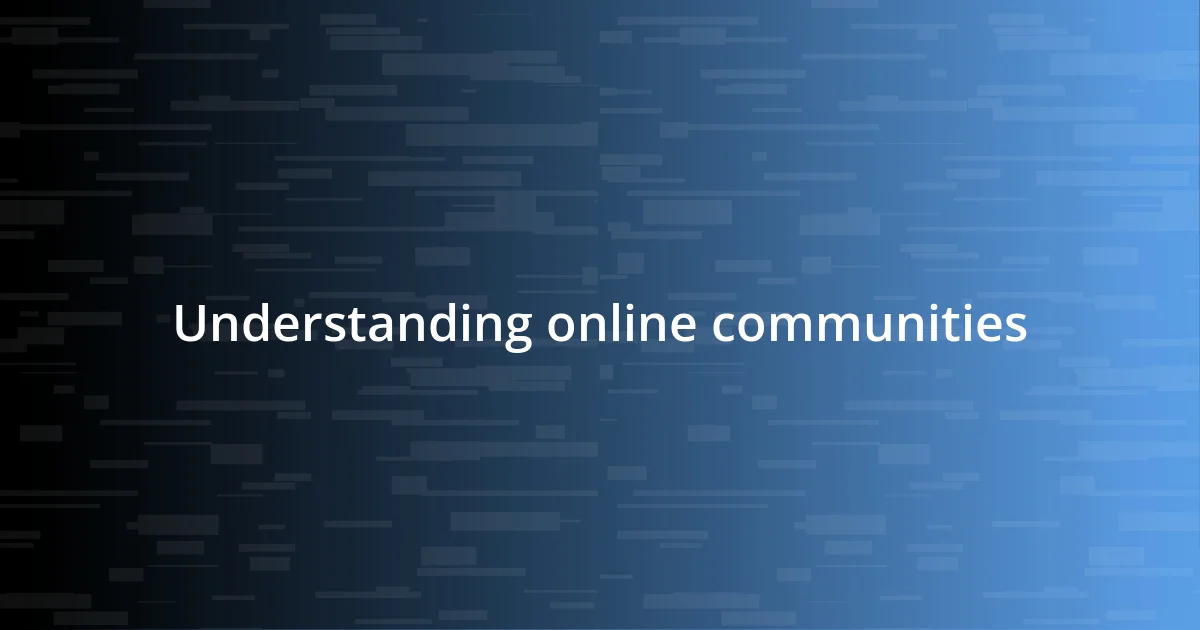
Understanding online communities
Online communities are fascinating spaces that allow individuals to connect over shared interests and experiences, often breaking geographical barriers. I remember joining a photography group online and feeling an immediate sense of belonging. It was incredible to see people from all walks of life share their work and offer constructive feedback, which made the learning process feel communal rather than solitary.
What intrigues me about these communities is how they foster genuine connections. Have you ever felt that rush of excitement when a stranger appreciates your hobby or passion? I have, and it’s a powerful reminder that we’re often searching for validation and camaraderie in a digital landscape. These interactions can lead to friendships that transcend the online realm, illustrating the depth of engagement possible in virtual spaces.
Even though online communities can sometimes feel overwhelming, their potential for personal growth is immense. I’ve seen countless individuals transform their skills and confidence through these platforms. It makes me wonder, how many of us have discovered new facets of ourselves simply because we dared to share our journey with others? Each member contributes a unique story, enriching the community and, in turn, each member’s experience.
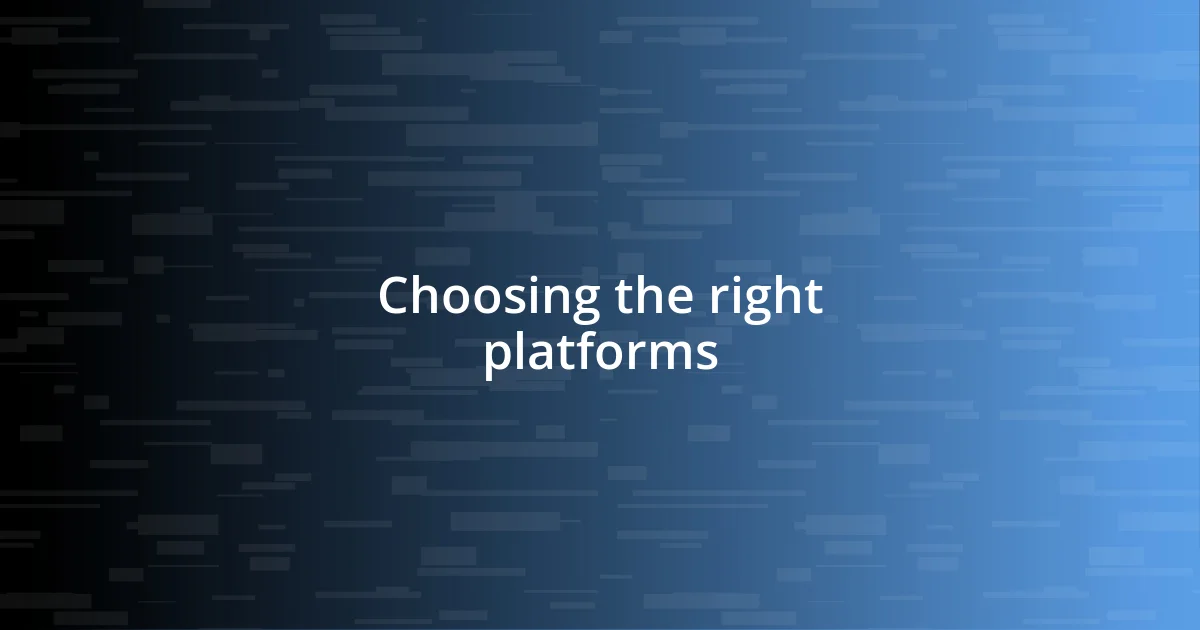
Choosing the right platforms
Choosing the right platform for engaging with online communities can be transformative. I still recall my initial struggle to find the right fit; I wandered through forums, social media groups, and niche websites, searching for somewhere that felt authentic and welcoming. Eventually, I discovered that the right platform can make all the difference in how you connect with others and share experiences.
When selecting a platform, consider these key factors:
- Community Engagement: Look for spaces where members actively participate and support each other. I found a group that regularly hosts discussions and events, which kept me motivated to contribute.
- Type of Content: Choose platforms that align with your interests; for instance, visual content thrives on Instagram, while more in-depth discussions work better on forums like Reddit.
- User Interface: A clean and intuitive design makes it easier to navigate and engage. I once joined a cluttered site that made interactions frustrating, leading me to leave quickly.
- Moderation Policies: Communities with clear guidelines can help maintain respect and decrease toxicity. I appreciate when moderators ensure a friendly environment, as it fosters better interactions.
- Accessibility: Ensure the platform is accessible across devices. I remember joining a mobile-friendly app that let me connect with others during my commute, which added immense value to my daily life.
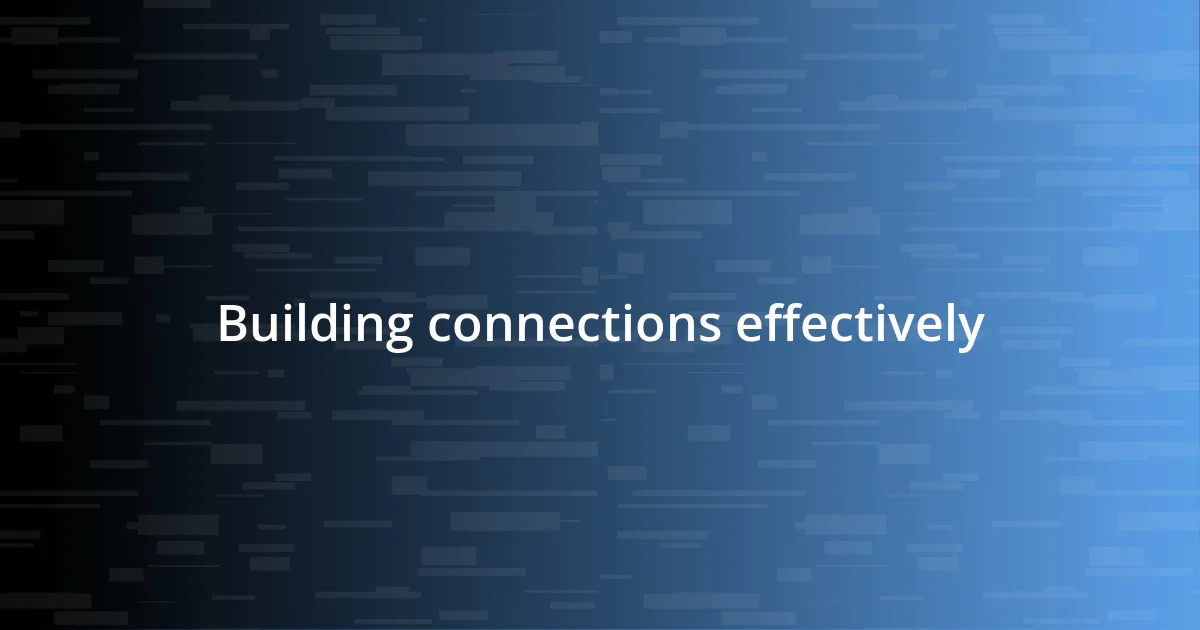
Building connections effectively
Building connections effectively in online communities can change the game for anyone seeking engagement. I’ve experienced moments where a simple comment on a post led to engaging discussions that felt like meaningful conversations. By asking open-ended questions, I’ve often facilitated deeper connections, allowing others to share their insights and experiences, which has created a space of mutual growth. It’s interesting how a digital interaction can feel just as significant as face-to-face encounters when approached thoughtfully.
I’ve noticed that vulnerability plays a crucial role in fostering connections. Sharing not just the highlights of my journey but also my struggles has invited others to open up, creating an atmosphere of authenticity. This mutual sharing goes beyond surface-level interactions. For example, I once revealed my anxiety about sharing my art, and it resonated deeply with many, sparking a conversation that led to finding solace and support among people who felt the same way.
Furthermore, participating in community-led initiatives has significantly enhanced the connections I’ve built. I volunteered for a collaborative project in a writing group, and through this teamwork, I forged friendships with individuals who I now regularly communicate with outside the group. It’s fascinating to see how working together toward a common goal can strengthen bonds, transforming acquaintances into friends, enriching the sense of belonging that these online spaces offer.
| Strategy | Description |
|---|---|
| Engaging Discussions | Ask open-ended questions to spark deeper conversations. |
| Emotional Vulnerability | Share your challenges to create a space of authenticity. |
| Collaborative Projects | Participate in group initiatives to build stronger connections. |
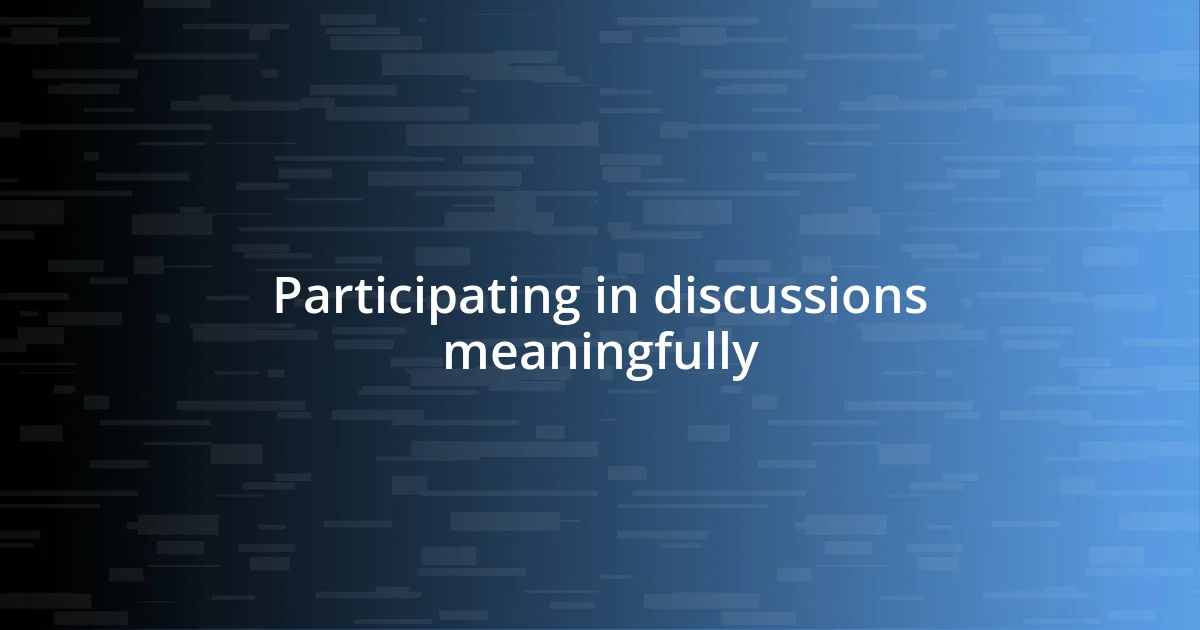
Participating in discussions meaningfully
Participating in discussions meaningfully is about digging deeper than surface-level interactions. I once joined a group focused on mental wellness, and instead of just responding with a “thank you” to posts, I began to share my own experiences and ask for others’ thoughts. It struck me how my genuine interest in their stories often prompted fellow members to open up, creating a dialogue that felt truly enriching. Have you ever noticed how a simple question can turn a casual conversation into something profound?
Emotional vulnerability is another key ingredient in meaningful participation. I remember a time when I hesitated to share my struggles with burnout in a creative community. When I finally did, the floodgates opened; others echoed my feelings, and we started a heartfelt discussion about managing expectations and self-care. Sharing those raw emotions connected us in a way that was palpable. That moment taught me that being open can build trust and encourage others to talk about their truths.
Moreover, I’ve found that adding a sprinkle of humor can lighten tense or serious discussions. Participating in a debate about productivity hacks, I cracked a joke about my own scatterbrained approach to organization. This not only made the conversation more enjoyable, but it invited others to share their own funny mishaps. It reminded me that while engaging seriously matters, sometimes a light-hearted touch can create a more inviting space, making each contribution feel valued. How do you incorporate humor or lightness into your online discussions?
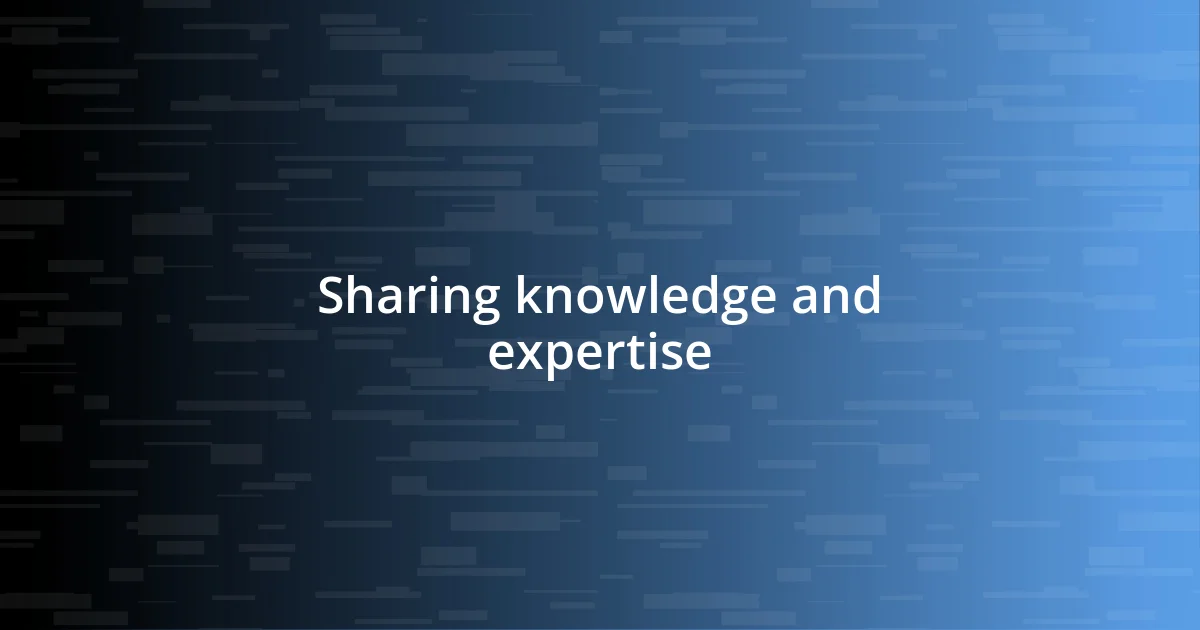
Sharing knowledge and expertise
Sharing knowledge and expertise in online communities has been a rewarding experience for me. For instance, I remember a time when I contributed to a forum on photography techniques. I offered tips on lighting and composition, and I was pleasantly surprised by the flood of responses. Not only did others share their own advice, but many thanked me for sparking a conversation that expanded our collective understanding. Isn’t it remarkable how sharing can often lead to a collaborative learning experience?
Throughout my journey, I’ve learned that humility plays a critical role in sharing expertise. When I joined a culinary group, I hesitated to share my cooking fails, fearing judgment. However, when I opened up about my kitchen disasters, others began sharing their own blunders. This led to a heartfelt exchange and even a virtual potluck where we all showcased our favorite (and not-so-favorite) dishes. Have you noticed how vulnerability can foster a sense of community?
There’s something magical about mentoring others in these spaces. I once guided a newcomer in a tech forum through their first coding project. Watching them grow from unsure questions to confidently completing assignments was incredibly fulfilling. It reminded me of my own early days when I had the same doubts, reinforcing the idea that sharing our knowledge not only helps others but helps us remember our own journey. Don’t you think there’s great value in lifting each other up in this way?
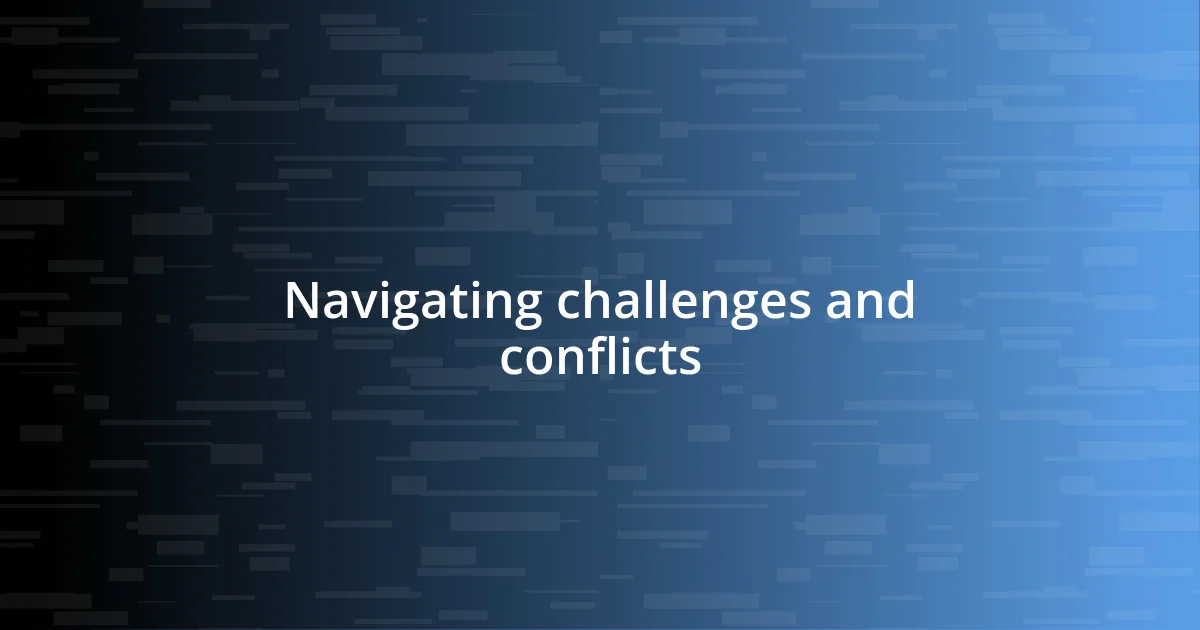
Navigating challenges and conflicts
Navigating challenges and conflicts within online communities can be a tricky endeavor. I recall a heated debate in a writers’ group where opinions clashed over the role of characters in storytelling. Initially, I felt overwhelmed, but instead of taking sides, I chose to acknowledge the different perspectives. I remember saying, “We all have our unique storytelling styles, and that’s what makes this conversation rich.” It was interesting to see how that one sentence diffused tension and redirected the discussion to a more constructive avenue.
Sometimes, conflicts arise from misunderstandings rather than genuine disagreements. I experienced this firsthand in a parenting forum when someone misinterpreted my comment about discipline. Their response was sharp, but instead of getting defensive, I calmly clarified my intention. It was remarkable how an open dialogue can change the atmosphere entirely. This taught me that approaching conflict with empathy and patience can transform negative interactions into learning opportunities. Have you found that clear communication often diffuses misunderstandings?
Handling persistent negativity can be challenging as well. In a group centered on mental health, I encountered a member whose constant cynicism cast a shadow over our discussions. Rather than ignoring it, I reached out privately to understand their perspective. Through that conversation, I discovered their struggles that led to their attitude. This taught me valuable lessons about compassion and support. After all, by choosing to engage rather than disengage, we can foster a more supportive community overall. How do you address negativity in your online interactions?
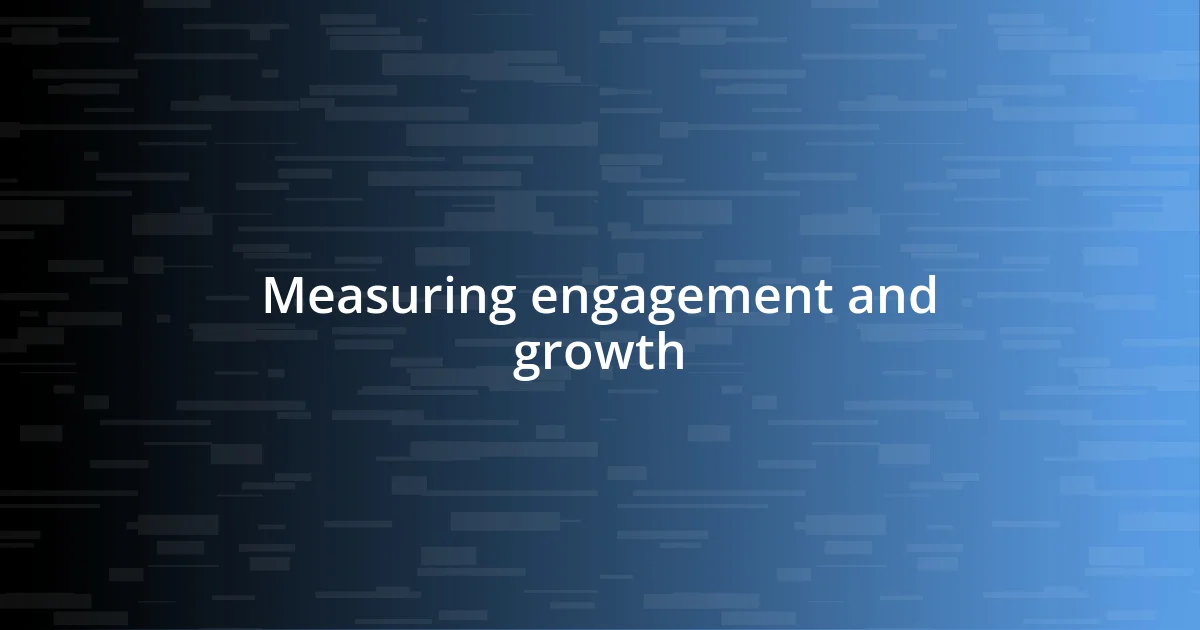
Measuring engagement and growth
When it comes to measuring engagement in online communities, I’ve found it’s often about the subtle shifts in interaction patterns. I vividly recall tracking responses to my posts in a self-improvement forum. At first, I noticed just a handful of likes and comments, but as I started sharing deeper insights from my own journey, those interactions began to multiply. It made me realize that authentic vulnerability can significantly enhance engagement. Have you ever observed how your openness encourages others to share?
Growth is another critical element to consider; it doesn’t always manifest in numbers alone. In one art community I frequented, our discussions naturally evolved from basic tips to more complex critiques over time. I could see my own progression reflected in how I approached feedback, becoming more confident and articulate in my responses. This personal development felt as rewarding as gaining followers. Doesn’t it seem that our growth often mirrors the evolution of those around us?
Analyzing metrics can be enlightening, but I emphasize the importance of qualitative feedback as well. In a fitness group, my transformation journey sparked conversations that surpassed mere statistics. Members shared their experiences and motivation, creating a ripple effect of encouragement that was inspiring to witness. I learned that the words we exchange—like, “Your story motivated me to take that first step”—carry immensely powerful weight in assessing engagement. Have you found that meaningful connections often matter more than a simple click?




